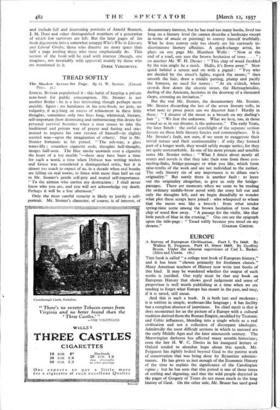TREAD SOFTLY
SAMUEL BUTLER popularised it : this habit of keeping a private note-book for public consumption. Mr. Stonier is not another Butler : he is a less interesting, though perhaps more amiable, figure : no harshness in his note-book, no jests, no vulgarity, if anything an excess of refinement in these little thoughts, sometimes only two lines long, whimsical, literary, self-important (how distressing and embarrassing this desire for personal survival becomes when a man ceases to take the traditional and private way of prayer and fasting and tries instead to impress his own version of himself—in slightly scented wax—upon the imagination of others). Nor is Mr. Stonier fortunate in his period. " The ash-tray, a glass water-lily ; countless cigarette ends, thoughts half-thought, images half-seen. The blue smoke unwinds over a cigarette the heart of a toy marble "—there may have been a time for such a word, a time when Dobson was writing triplets and Gosse was considered a distinguished critic, but it is almost too much to expect of us, in a decade when real bombs are falling on real towns; to listen with more than half an ear to Mr. Stonier's gentle self-pity and muted self-importance. " To the airman who carries my destruction : I shall never know who you are, and you will not acknowledge my death. Perhaps it will be a fine afternoon."
Only the most careful veracity is likely to justify a self- portrait. Mr. Stonier's character, of course, is of interest, of documentary interest, but he has read too many books, lived too long on a literary level (he cannot describe a landscape except in terms of music or painting) to convey himself truthfully. What he does convey only too dearly are his curiously in- discriminate literary affinities. A quick-change artist, he plays on one page Mr. Humbert Wolfe : " Now at the end of a road, one sees the brown hesitation of trees . . . " ; on another Mr. W. H. Davies : " This chip of wood freckled by the rain might be a moth. Hullo, it's flown away." Now quick behind a screen and on with a pigtail : " You who are dazzled by the street's lights, regard the moon; " then smooth the hair, draw a middle parting, plump and pacify the features, no need for names : " At six o'clock, when crowds flow down the electric street, the Hermaphrodite, darling of the Ancients, hesitates in the doorway of a thousand shops, crooning an invitation."
But the real Mr. Stonier, the documentary Mr. Stonier, Mr. Stonier discarding the last of the seven literary veils, in what note or prose poem can we discover him ? Hardly in these : " I dreamt of the moon as a brooch on my darling's hair " ; " We fear the unknown. What we love, too, in those round us as in our dreams, is the unknown." The early Yeats, the later Stitch : the awful searchlight of the separate section fastens on these little literary fancies and commonplaces. It is Mr. Stonier's fault, not ours, if we seem to exaggerate their trivial nature and their sentimentality : if only they formed part of a longer work, they would safely escape notice, for they are quite unremarkable. In one of his more prosaic and sensible notes Mr. Stonier writes : " What I detest about nearly all essays and novels is that they take their tone from those con- necting-links, bridge-passages or what you like, which form nine-tenths of the work and are not individual to the author, The only literary sin of any importance is to dilute one's, originality." But surely there is another fault : to leave out the originality altogether, to give us only the bridge- passages. There are moments when we seem to be reading the ordinary middle-brow novel with the story left out and only the thoughts left, and we begin dreadfully to wonder what plot these scraps have joined : who whispered to whom that the moon was like a brooch : from what tender spring-time scene among the brown hesitation of trees that chip of wood flew away. " A passage for the violin, like that little patch of blue in the evening." One can see the epigraph upon the title-page : " Tread softly because you tread on my














































 Previous page
Previous page